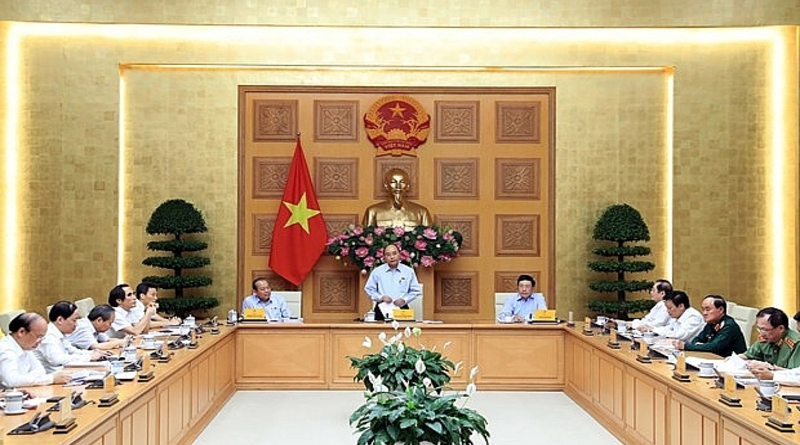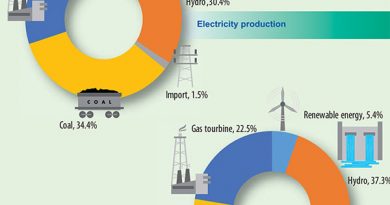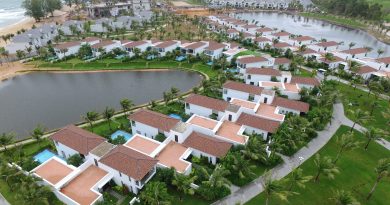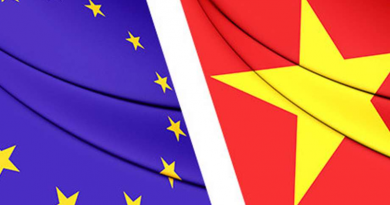Post-pandemic focus for new investments
Prime Minister Nguyen Xuan Phuc has ordered the establishment of a special working group in charge of formulating attractive policies to woo more foreign investment, which was dubbed by the PM as “a new wave to surge from the global strategic relocation of production and operations by multinational corporations.”
The policies to be created include incentives on tariffs, access to land, as well as solutions to prevent further disruptions to the supply chain and a lack of human resources, to be hammered out by the Ministry of Foreign Affairs, Ministry of Planning and Investment (MPI), as well as other ministries and relevant authorities.
Vietnam has been considered a safe destination by foreign investors looking to relocate and diversify operations thanks to its stable policy framework and success in controlling the COVID-19 outbreak. However, other countries in the ASEAN have also been issuing new policies and attractive incentives to tap into the same capital flows, posing Vietnam the need to find a way to set itself apart and improve its competitive edge.
According to statistics from the MPI’s Foreign Investment Agency (FIA), in the first five months of this year, Vietnam lured in $13.9 billion worth of newly-registered, newly added, and foreign-based stake purchase and capital contribution investment capital. Although this figure is down 17 per cent on-year, it remains higher than the figures of the same periods of 2016 ($10.1 billion), 2017 ($12.1 billion), and 2018 ($9.9 billion).
According to the FIA’s former director Phan Huu Thang, Vietnam’s current legal framework is quite complete, however, the gap between the word of the law and real-life implementation is quite large. Notably, Resolution No.50-NQ/TW issued last August on orientations to perfect mechanisms and policies, and raise quality and efficiency of foreign investment by 2030 has already outlined specific foreign investment goals for the time to come, regarding registered capital, disbursed capital, as well as links between foreign-invested enterprises (FIEs) and their domestic counterparts.
However, the actual implementation and the specific roles and tasks of ministries and relevant authorities have not been clarified yet.
“Along with newly-registered projects, multinational groups which are already present in Vietnam are also looking to expand their local facilities, thus the government has ordered the establishment of the working group, which will work with each of them to discuss their difficulties as well as their individually proposed incentives and then build solutions so that they can continue disbursing capital,” Thang told VIR. “Furthermore, the taskforce will monitor the progress of those projects which have been licensed but have yet to begin construction.”
According to him, Vietnam’s stature and foreign investment attraction policy has changed remarkably over the decades, however, incentive packages remain just as important to filter out large-scale and high-quality projects. “The establishment of the special taskforce will help us draw in foreign eagles. The most important missions for the group are completing the legal framework, stepping up investment promotion activities at cities and provinces, as well as online promotion programmes,” he said. “Besides this, it is necessary to select members who have the requisite skills, abilities, and vision. Last but not least, it should have full authority to issue decisions for such projects.”
The main purpose of Vietnam’s foreign investment attraction strategy is “encouraging eagles to come and build nests” in Vietnam by providing them with numerous special incentives. For example, Samsung – the largest South Korean investor in Vietnam, with total investment capital of over $17 billion for different facilities churning out electronic items – has requested a wide range of privileges for its $220 million research and development (R&D) centre in Hanoi.
Samsung Vietnam has asked for an exemption from land lease fees for 50 years, site clearance costs, and import tariffs on the R&D centre’s equipment, and customs procedures to transfer goods between the group and the R&D centre.
Besides that, Samsung requested that the annual personal income tax of its employees at the centre be cut by half. The MPI and other relevant ministries, as well as the authorities of Hanoi have basically agreed to the group’s requests.
According to experts, it is time to “re-design the game” so that the country can maximise benefits from foreign-invested projects. Notably, foreign investors should be able to request suitable and legitimate incentives for their projects. However, local authorities need to strictly monitor their investment process.
Over more than 30 years since Vietnam opened for foreign investors, the country’s economy has overcome a number of crises, impacting foreign investment. Vietnam has also been co-operating with a number of partners to reform its policies in favour of investors and businesses, in line with international practices.
For example, in 2003, the MPI was put in charge of co-operation with the Japanese government to establish the Vietnam-Japan Joint Initiative. During the past 16 years with seven phases, the joint initiative made many proposals to Vietnamese agencies, playing an important role in improving the business and investment environment of Vietnam.
Reviewing the results of the seventh phase in December, Japanese former Ambassador Kunio Umeda said that the initiative contributed to strengthening co-operation between the two nations and has yielded practical results such as the implementation of official development assistance projects, grants, and infrastructure development.
| A number of eagles have expanded their nests in Vietnam, with several notable moves made just before the global coronavirus outbreak. With the outbreak mostly over in Vietnam, many groups are looking to get back on track as soon as possible. Recently, Thailand-based SCG gained approval to pump an additional $1.39 billion into Long Son Petrochemical Complex located in the southern province of Ba Ria-Vung Tau, increasing the total investment capital to $5.1 billion. The new investment in the Long Son complex is expected to breathe new life into the venture which is running significantly behind schedule. The project’s construction began in early 2018. Last year, SCG vowed to put the project into operation in late 2022.
Japanese electronics manufacturer Panasonic two weeks ago declared halting the operations of its large washing machine factory in the suburbs of Bangkok and announced that it would migrate the facility to Vietnam. Accordingly the factory, together with a research and development centre in Thailand, will be closed by next March. In addition, numerous suppliers of global ITC groups have completed expansion in Vietnam, including China-based Luxshare-ICT, one of Apple’s global partners, with two expanded projects in the northern province of Bac Giang and the central province of Nghe An. Others include South Korean aerospace manufacturer Hanwha Aero Engine, Japanese carmaker Yokowo, and Hong Kong-based textile producer Huafu Industrial, as well as another Apple assembly partner, Goertek from China. |
This seventh phase was implemented over 17 months with 52 proposals. Notably, 44 of the 52 items have been implemented on schedule and the remaining eight items are being carried out. Those implemented are related to tourism, the improvement of the legal framework, land law, and public-private partnership policy framework, as well as the development of supporting industries, labour and wages, and stock market reform.
Source: VIR















